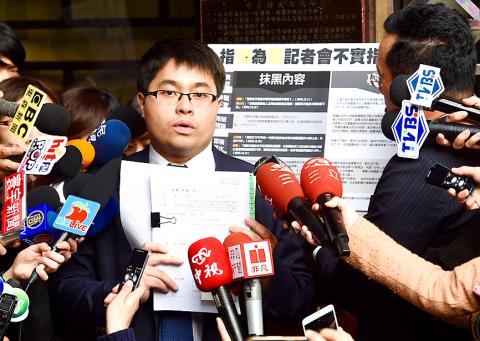The Democratic Progressive Party (DPP) yesterday filed a lawsuit against Chinese Nationalist Party (KMT) lawmakers Alex Tsai (蔡正元) and Alicia Wang (王育敏) and former legislator Chiu Yi (邱毅) over their allegations that DPP presidential candidate Tsai Ing-wen (蔡英文) had speculated in real estate.
“In the past few days, Alex Tsai, Wang and Chiu have been making false accusations against Tsai Ing-wen with the intention of defaming her,” DPP spokesman Huang Di-ying (黃帝穎) told an afternoon news conference held outside the Taipei District Prosecutors’ Office. “We are filing a lawsuit claiming that they have violated Article 90 of the Presidential and Vice Presidential Election and Recall Act (總統副總統選舉罷免法).”
Under the article, anyone convicted of “spreading a rumor or false saying by text, picture, audio tape, video tape, speech or other method for the purpose of making a candidate elected or not elected” can face up to five years in prison.

Photo: Lo Pei-der, Taipei Times
Huang said the allegations the trio have made against Tsai Ing-wen are patently false, since their details about the number of plots of land, the size of the plots and the prices have all been incorrect.
Attorney Wellington Koo (顧立雄), one of the DPP’s legislator-at-large candidates, said the party would prefer to ignore the trio, but it needs to take legal action to prove the allegations are false.
“Alex Tsai and the other two are [making allegations] only because they need to prove their own existence, they need to attract attention,” Koo said. “However, it is not just the trio. The whole KMT is anxious about the lack of evidence.”
Comparing DPP Legislator Tuan Yi-kang’s (段宜康) criticism that KMT vice presidential candidate Jennifer Wang (王如玄) had also engaged in real-estate speculation, with the allegations against the DPP chairperson, Wang’s case is more problematic since military dependents’ housing units were built for disadvantaged people, Koo said.
Tuan has accused Wang of engaging in speculative sales of military dependents’ apartments, which were converted by the government from old housing for military dependents — and sold at a subsidized price — solely for the purpose of improving their living conditions.
By law, such apartments cannot be resold within five years of their original purchase.
Tuan has accused Wang of circumventing the law by making debt assumption transactions, in which the buyer makes a payment in cash or in a promissory note in exchange for future ownership of the property after the five-year waiting period.
“Tsai Ing-wen’s case is rather simple. She bought land 30 years ago and sold it nearly 20 years ago,” Koo said. “Yet the KMT trio has made false accusations based on wrong information about land size, plot numbers and selling prices.”
Koo said the DPP would continue to monitor the KMT’s moves and would take legal actions accordingly.

Intelligence agents have recorded 510,000 instances of “controversial information” being spread online by the Chinese Communist Party (CCP) so far this year, the National Security Bureau (NSB) said in a report yesterday, as it warned of artificial intelligence (AI) being employed to generate destabilizing misinformation. The bureau submitted a written report to the Legislative Yuan in preparation for National Security Bureau Director-General Tsai Ming-yen’s (蔡明彥) appearance before the Foreign Affairs and National Defense Committee today. The CCP has been using cognitive warfare to divide Taiwanese society by commenting on controversial issues such as Taiwan Semiconductor Manufacturing Co’s (TSMC, 台積電) investments in the

INVESTIGATION: The case is the latest instance of a DPP figure being implicated in an espionage network accused of allegedly leaking information to Chinese intelligence Democratic Progressive Party (DPP) member Ho Jen-chieh (何仁傑) was detained and held incommunicado yesterday on suspicion of spying for China during his tenure as assistant to then-minister of foreign affairs Joseph Wu (吳釗燮). The Taipei District Prosecutors’ Office said Ho was implicated during its investigation into alleged spying activities by former Presidential Office consultant Wu Shang-yu (吳尚雨). Prosecutors said there is reason to believe Ho breached the National Security Act (國家安全法) by leaking classified Ministry of Foreign Affairs information to Chinese intelligence. Following interrogation, prosecutors petitioned the Taipei District Court to detain Ho, citing concerns over potential collusion or tampering of evidence. The

‘COMPREHENSIVE PLAN’: Lin Chia-lung said that the government was ready to talk about a variety of issues, including investment in and purchases from the US The National Stabilization Fund (NSF) yesterday announced that it would step in to staunch stock market losses for the ninth time in the nation’s history. An NSF board meeting, originally scheduled for Monday next week, was moved to yesterday after stocks plummeted in the wake of US President Donald Trump’s announcement of 32 percent tariffs on Taiwan on Wednesday last week. Board members voted to support the stock market with the NT$500 billion (US$15.15 billion) fund, with injections of funds to begin as soon as today. The NSF in 2000 injected NT$120 billion to stabilize stocks, the most ever. The lowest amount it

NEGOTIATIONS: Taiwan has good relations with Washington and the outlook for the negotiations looks promising, Minister of Economic Affairs J.W. Kuo said Taiwan’s GDP growth this year is expected to decrease by 0.43 to 1.61 percentage points due to the effects of US tariffs, National Development Council (NDC) Minister Paul Liu (劉鏡清) said at a meeting of the legislature’s Economics Committee in Taipei yesterday, citing a preliminary estimate by a private research institution. Taiwan’s economy would be significantly affected by the 32 percent “reciprocal” tariffs slapped by the US, which took effect yesterday, Liu said, adding that GDP growth could fall below 3 percent and potentially even dip below 2 percent to 1.53 percent this year. The council has commissioned another institution